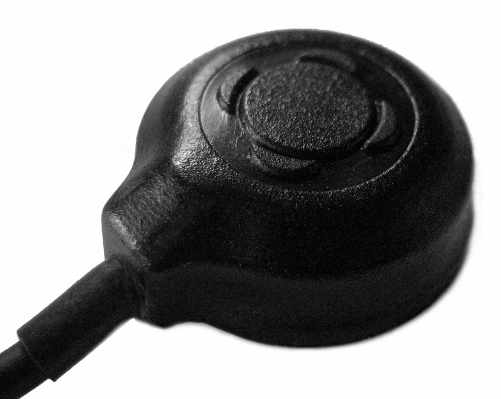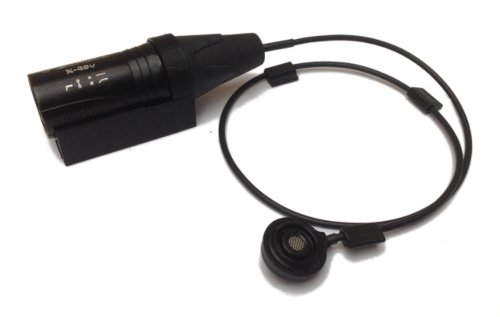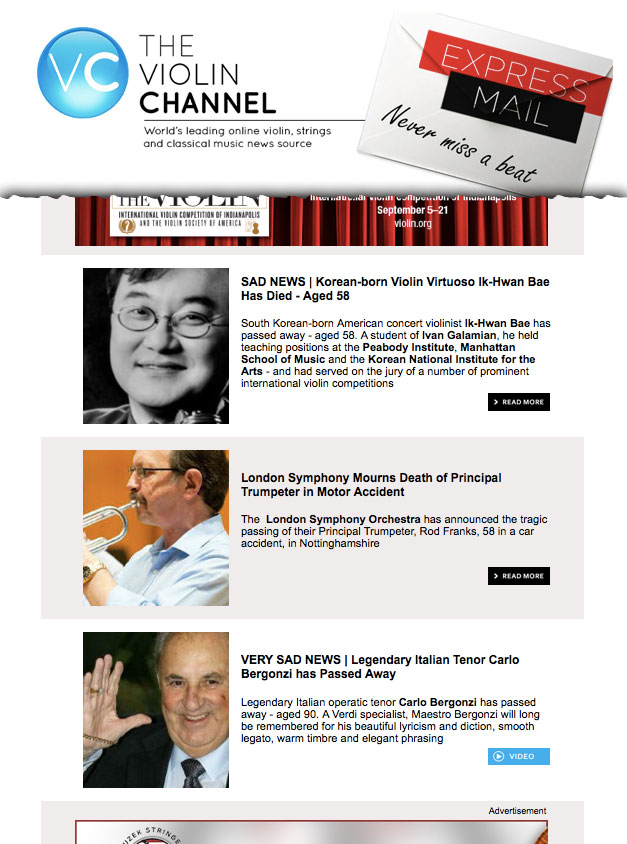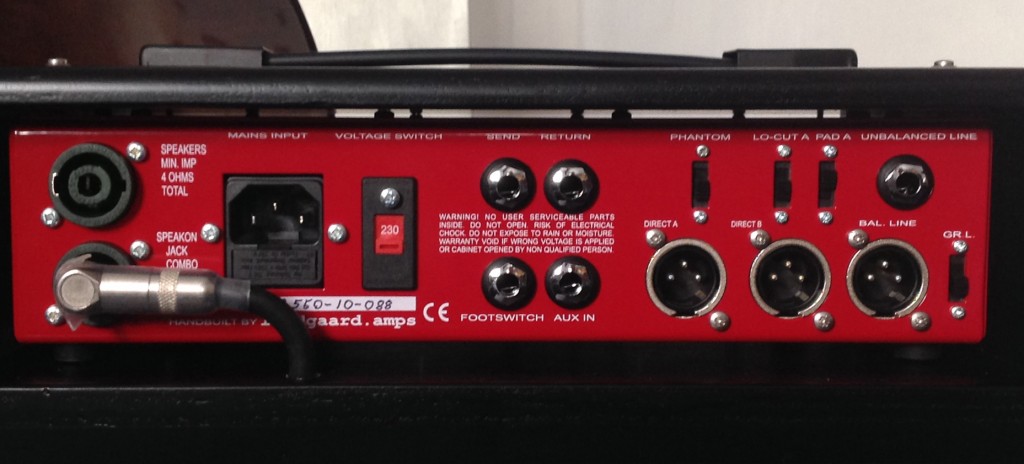Roger Hargrave, a british violin maker who lives and works in Germany, has built his first double bass and wrote a interesting blog about this project on the website ‘Maestronet’. After having finished the bass, he has put his text (24000 words in total) and 371 photos together to an extensive e-book, which explores the design making and varnishing of a double bass, but it also includes several sections relating to violin/viola making and varnishing. The e-book can be downloaded for free at his website: www.roger-hargrave.de
Special offer from Ischell microphones
Ischell, the french maker of contact microphones, offers a special promotion for readers of the DoubleBassGuide.com: save 8% on any order at the Ischell webshop site, using the voucher code “JONASLOHSE”.
The Ischell microphones mount to the double bass top by means of putty. It’s an active system that runs on phantom power (provided by a preamp or XLR).
very sad news
The Violin channel, a news website and newsletter mainly about string instrument and classical music, also features news about musicians who recently passed away. To me, it’s remarkable that they use categories here.
- (simple case of death)
- sad news
- very sad news
Questionary: Paul Cannon
My German language weblog www.kontrabassblog.de features an interview category called Fragebogen (which means “questionary” in English).
Paul Cannon is the newest member of the Ensemble Modern here at Frankfurt. But because he is from Houston, Texas, I translated the questions for him … so that’s the first article of my new interview category here at DoubleBassGuide.com:
Paul studied with Paul Ellison at Rice University in Houston, Texas, where he received Bachelor’s and Master’s degrees in performance. In 2010, Cannon was awarded a Wagoner Fellowship in Paris, France, where he studied extensively with famed bass soloist François Rabbath. While there, he received a performance diploma and teaching certificate from the Institut Rabbath before returning to Houston.
Paul has joined Ensemble Modern in the spring of 2014. Previously, he has been a featured artist at the TCU Double Bass Symposium and with the contemporary ensemble Musiqa. He has appeared as a guest with the Houston Symphony, Boston Symphony, Austin Symphony, and the Houston Grand Opera. He has performed at festivals including Aspen, Tanglewood, Sarasota, Spoleto USA, and Domaine Forget. From 2011-2014, he was Director of Education at the Quantum Bass Center and provided numerous outreach services throughout Houston as a 2013 Da Camera Young Artist.
Paul came to my workshop as a customer, but since he has also worked as a luthier in the USA, I always enjoy discussing details and getting insights into the american double bass world …
What CD is in your stereo at the moment?
Well, I just moved here two months ago and still haven’t bought a proper stereo, and all my CD’s are still in boxes. It looks like the last thing I listened to on my computer was “The Tuning CD” — I guess that shows where my priorities have been lately! The last real thing I listened to was Mark Dresser’s “Time Changes”.
Which bassist(s) do you listen to most often?
I’m a big fan of Renaud Garcia-Fons, Mark Dresser, Stefano Scodanibbio, Sebastian Dubé, and Edgar Meyer. They have all pushed bass playing so far, while also making music I really love to hear.
Which bassist was you main influence?
I’ve had so many strong influences personally and professionally. My two main teachers, Paul Ellison and François Rabbath, were definitely my biggest mentors and really shaped me into the kind of player I wanted to be. I also drew an incredible amount of inspiration from my peers at Rice University, and from all the teachers at Domaine Forget.
5th World Bass Festival Wroclaw, Poland
In August, not only the Bass2014 (Amsterdam/NL) will take place. Bassplayers also come together at Wroclaw, Poland.
August 16th – 21th, 2014
* Anniversary 20-years of the Polish Society of Double Bassists
* Anniversary Double Bass Competition in four categories
* Concerts
* Master classes
* Double bass orchestra
* Exhibition
How gut strings are made
Lundgaard amps
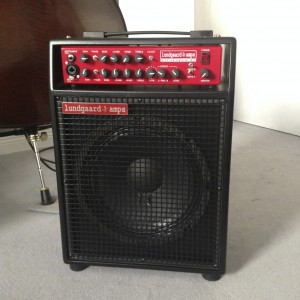
I confess: I’m a bit nerdy about amps, and actually own more of them than I really need. The newest amp in my collection ist the Lundgaard “Double”. These fine and rare amps are designed and handmade by bassist Jesper Lundgaard (Thad Jones/Mel Lewis Bigband) from Kopenhagen/Danmark. They are only available from Jesper directly. This is not the only thing that reminds me of the legendary Walter Woods Amps. Size and color of the amps are also similar, but Jesper’s amps aren’t just a copy of the WW amps, but packed with smart details and ins and outs … it has just everything you expect from a double bass amp nowadays.
The “Double” is available as amp head, or built into a speaker cabinet as combo amp. I have the combo with 10“ speaker, which is remarkable light. You have to search for an amp with a better weight-to-power ratio. Which is an indication for the fact that this amp was designed by a performing double bassist. But the amp is not only a double bass amp: it’s also suitable for guitar, keyboard, violin or voice. For these instruments, Jesper has built in effects like reverb and echo.
The “Double” has two channels, each of them with gain, bass, low mid, high mid and treble controls. Channel A allows to connect both standard and XLR jacks, channel B just has a standard jack input with 3 megohms input impedance for piezo pickups. Both channels have a phase reverse switch, mute and low cut filter. A chosen effect can be blended into both or just one channel, and switched on and off by means of a foot switch (included). If you don’t like any of the 16 effects: the back panel has send and return for external effects. Also on the back panel: the phantom power switch for channel A, a ground lift switch, two speaker-outs (combo XLR and speakon jacks), Pad-switch for channel A (in case a pickup’s output is a too hot), balanced and unbalanced main outputs as well direct out (XLR) for both channels separately. So, there is pretty much everything you will ever need on stage.
How does this amp perform? It’s a no-brainer. I plugged in, dialed out some of the mids, and I was done. The sound is round, well balanced, but powerful. That’s what you basically expect from a bass amp – the rest is a matter of taste. And the Lundgaard is to my taste, certainly.
further informations at www.lundgaardamps.com
Bassist of the Day: Scott LaFaro
Today would be the 78th birthday of the great Scott LaFaro, who died in a car accident in 1961. LaFaro is best known as the bassist in Bill Evans’ groundbreaking trio, and also worked with Chet Baker, Ornette Coleman, Sonny Rollins and the Stan Kenton Orchestra.
Barrie Kolstein, luthier and president of Kolstein Music in Baldwin, New York, has chosen Scott’s birthday to announce that he is making a gift of LaFaro’s double bass to the International Society of Bassists.
The Kolstein and LaFaro families have had a long and affectionate relationship of almost 60 years. Barrie’s father Sam Kolstein first met Scott LaFaro when they were introduced by George Duvivier, a first-call bassist in New York City who recommended that Sam work on a bass Scott had recently acquired and brought Scott to meet Sam at Sam’s shop. Upon hearing Scott trying out instruments in the shop, “Sam looked at George and simply said ‘Who it that and what is that?'” Barrie recalls. “You have to understand that even by today’s standards, Scotty’s playing would turn heads, but back in those years, his style of playing was unheard of and completely unique in every aspect.”
After Scott’s death in a car crash, a heartbroken Sam purchased the badly damaged bass from Scott’s mother with a promise that it would be restored and played again. But it was his son Barrie who eventually undertook the arduous restoration decades later, and Scott’s bass returned to the world in 1988 at the ISB’s convention in Los Angeles. Since then Barrie has been the steward of the Scott LaFaro Bass, becoming friends with Scott’s sister and biographer Helene LaFaro-Fernandez in the process, and making the bass available for recordings (notably by Marc Johnson and Phil Palombi) and live performances.
The International Society of Bassists gives the Scott LaFaro Prize to the first place winner in its biennial jazz competition thanks to support from Scott’s four sisters and the endowment fund they created for the ISB in memory of their brother. Now, with the gift of the Scott LaFaro Bass, the ISB will make the instrument available for performances by ISB members as part of a future Scott LaFaro Archives at Ithaca College in Ithaca, New York, where Scott’s father, a violin virtuoso and band leader, attended in the early days of the conservatory and where Scott went to classes for a year before leaving school for a career that continues to grow in legend and influence. Until the archives are ready to receive the instrument, the Scott LaFaro Bass will continue to reside at Kolstein Music.
“Thanks to Barrie Kolstein’s extraordinary and extremely generous gift to the ISB, which raises our net worth by six figures, the residency of Scott’s bass at Ithaca College will be a lasting tribute,” says ISB general manager Madeleine Crouch. Nicholas Walker, professor of bass at Ithaca College, adds, “For bassists everywhere, Scott LaFaro’s sound and musicianship have been a deep source of inspiration. Both the LaFaro and Kolstein families are committed to keeping us all connected to the man behind that sound, a man they loved dearly. The creation of a living archive at Ithaca College will make it possible for future generations of bassists to come into direct contact with his instrument and the materials that helped shape Scott LaFaro as an artist. What a gift to us all!”
With some 3,000 members in over 40 countries, the International Society of Bassists is dedicated to the double bass. www.ISBworldoffice.com
See you at the Frankfurt Musikmesse …
On Wednesday (March, 12), the Musikmesse Frankfurt starts. I’ll be exhibiting at Hall 3.1, where all the acoustic guitar and violin making companies are located, at booth H27. Hope to see you there!
Gary Karr at the 2014 TCU International Double Bass Festival
Gary Karr headlines the 2014 TCU International Double Bass Festival,
March 8-9 at the TCU School of Music. All recitals and masterclasses in the PepsiCo Recital Hall will be webcast live, including Gary Karr’s recital on Saturday, March 8th at 7:30 pm.
www.youtube.com/user/TheTCUSchoolofMusic/
Tickets for any recital at the bass fest can be purchased for $10 at the registration desk. Day of auditor tickets are only $20 ($15 in advance) for the festival.
www.music.tcu.edu/BassFest2014.asp
Also featuring:
Jeff Bradetich (University of North Texas)
William Clay (Fort Worth Symphony)
Paul Ellison (Rice University)
Blaise Ferrandino (TCU composer and bassist)
Jessica Gilliam-Valls (Southwestern University)
Kyp Green (TCU professor of jazz bass)
Michael Klinghoffer (Israel, Jerusalem)
Eugene Levinson (The Juilliard School)
Jiwu Li (Shanghai Conservatory)
Yuan Xiong Lu (TCU)
Szymon Marciniak (Polish virtuoso)
Mark Morton (Texas Tech University)
David Neubert (Austin Symphony)
Brian Perry (Fort Worth Symphony)
Frank Proto (bassist & composer)
Nicholas Scales (West Texas A&M University)
John Schimek (Oklahoma City University)
Lynn Seaton (University of North Texas professor of jazz bass)
Tian Rui Zhao (Shenyang Conservatory)
TianYang Liu (First Prize Winner of the 2013 ISB Solo Competition)
Brazil’s UFMG Double Bass Group.

